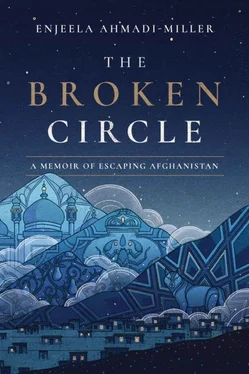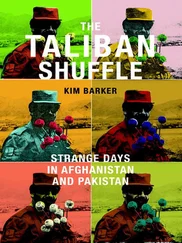One bright morning, with sunshine gleaming through stained-glass dining room windows, as we sat around another sumptuous breakfast, Padar said he had an announcement to make.
“We are leaving in a few days, so pack your clothes,” he said.
“We got our passports?” Zia said. The excitement ran through us.
I jumped up from my chair. “We’re going to Mommy!”
“We’re going to India at last,” Zulaikha said, a tone of relief in her voice.
“Hold on, everyone,” he said. “We’re not going directly, but we are going to India.”
We peppered him with questions, but he didn’t tell us too much, except that we were flying to Dhaka, then taking the train into New Delhi.
That night in the room I shared with Laila, we spread out her map on her bed. The flight from Karachi to Dhaka, Bangladesh, traveled clear across the entire nation of India. The route was thousands of miles long. And the plane would go right over New Delhi.
“Why would we do this?” I asked. “Why can’t we land here?” I pointed to the capital of India on the map.
Laila shrugged as she traced a route on the map with her finger. “He’s got his reasons, but he’s not going to tell us.”
“He must have gotten our passports, didn’t he?”
“Don’t be stupid. We wouldn’t be flying on an airplane if he didn’t.”
Yes, of course. We had been in this home for months. He must have the proper documents for him to decide it was time to leave. I lay back on my bed, imagining for a minute that when he handed me my passport, I would guard it with my life. Someone would have to steal my soul before I let it go. I would tie it to my body with a belt and wear all my clothes over it. That little paper book was all that kept me, my sisters, Zia, and Padar from being with Mommy. From being a whole family again. That night as I sloughed off into sleep, my thoughts ran wild, imagining what it was going to be like to see Mommy again, to look into her eyes, and tell her everything that had happened in the last three years.
Our days of waiting were coming to an end.
The black glass windows of Jinnah International Airport’s main terminal gleamed in the early-morning sunlight as we rolled toward it in Abbas’s big black car. At the curb of the busy terminal, the driver hopped out and opened doors, unlocked the trunk, and shuffled out our luggage while I stood on the sidewalk, taking in the scene. Men in colorful shalwar kameez and women in bright Punjabis were busy hefting luggage and hurrying to catch their flights. My sisters and I wore our new Punjabis, with bangles and earrings to match, and new shoes. We soaked in the excitement of traveling as we followed Padar and Abbas into the terminal.
Padar strode with such confidence as he and Abbas led us to the counter. We checked our luggage and took only our backpacks on board. Abbas escorted us down the long terminal concourse; its polished tile floor sparkled under the lights. There was a long line at the gate for our flight to Dhaka. I had never heard of Bangladesh before Laila had showed it to me on a map the other night. It was a new nation, formerly part of Pakistan. Padar had never explained why we had to fly across the whole of India instead of traveling directly to New Delhi, but if there was anyone we could trust to get us to Mommy, it was him.
The four of us kids stood in the waiting area trying to contain our excitement. Abbas and Padar moved up to the counter to speak to the attendant. They had a quick conversation, and the man looked directly at us, and Abbas and Padar nodded. They must have announced our flight, because people rose from their seats in the waiting area, taking up luggage and bundles and corralling children. A worker opened the door to the stairs leading to the plane. The two men continued to speak to the attendant off to the side, then turned and headed toward us. Padar had a tight smile on his face, as if he were pleased with his conversation but concerns lingered in his clenched jaw.
The two men embraced, a final goodbye. Abbas touched each of our heads and wished us well. After he left, Padar said to us, “Let’s go.” We picked up our backpacks and followed him.
He strode up to the desk of Pakistan International Airlines, where two men clad in blue uniforms worked behind the counter. A long line of passengers stood in front of one attendant, who took proffered tickets. Padar held all of our tickets, which were stuffed into their paper jackets. With a furtive glance of his dark eyes, the other man behind the counter scanned the crowd lined up in front of the attendant next to him before Padar handed over the thick packets. He lowered them out of sight to his desk.
This was the first time I had ever flown on an airplane, and all the things that went on were a bit mysterious and intriguing. Years before, Mommy had left with Vida and Shapairi on an airplane. Before they left, they went for photos for their passports. I’d never seen a passport before, and I didn’t remember sitting for any photos, so I wondered what ours looked like. I nudged away from beside Padar, who intently watched the man with our tickets. I slipped around the side of the counter, which was a couple of inches taller than me, until I could see the counter in front of where the man stood, shifting his weight from foot to foot as if marshaling his energy. The packets were stuffed with rupees, the same Pakistani bills that Abbas’s daughters had used to pay for our clothes and treats when they took us shopping.
The man turned his dark eyes on me, his face contorted in silent rage. He began cursing at me in Urdu, waving with his hand for me to leave. Padar reached around the side of the desk and yanked me by the hand to him. Once beside him, he froze me with a reproachful glare. He held me close by him as the attendant finished his work. The man handed the packets back to Padar. He led us through the door, down the stairs to the tarmac, and across to the stairs leading to the plane. Padar clutched my hand all the way, lest I get away from him. He showed a flight attendant, dressed in a crisp blue skirt and jacket, our tickets. She smiled and motioned us up the stairs and into the plane.
We were on our way to see Mommy.
The plane ride took most of the day. Padar seemed distant, preoccupied, the whole trip. Zia and I sat behind him, Zulaikha and Laila across the aisle from us. Zia allowed me to have the window so I could watch everything. When the plane finally lifted off the ground, I felt a lightness in my thoughts even as I was gently pushed back into my seat as the big steel machine rose higher and higher into the blue sky. Soon we were skimming along among the clouds, wispy strands of cotton that swirled around us as we sped on our way. I had dreamt of this day. The day we would finally stop being guests in others’ houses or living in hotel rooms, and settle down into a home of our own, like we had had in Kabul, all of us together in one large family. Even as Zia and I played cards and laughed and ate the chicken meal and drank the sodas the very nice attendants set on our seat trays, I couldn’t help but wonder if Mommy would even remember me. Some nights when I closed my eyes, all I saw until I drifted off was the back of her perfectly coiffed head of hair through the rear window of the car as she pulled out of the driveway for her plane ride to India. She had never turned to wave goodbye.
We landed at Hazrat Shahjalal International Airport late in the afternoon. I glimpsed the city of Dhaka in the distance as the plane floated in for a landing. It looked endless, with tall buildings and warrens of streets jammed with cars. They moved like ants, millions of ants.
We deplaned and strolled through the spacious, modern concourse among women in bright saris and shalwar kameez of every color, men in jeans and lungis and bright shirts, and a few in suits. Padar insisted we stop at one of the shops that sold snacks. We loaded up on little pastries, fruit, candy, and soft drinks. The train ride to New Delhi would be long, and we’d have to change trains often, and we wouldn’t always stop to eat. We each stuffed food and drink in our packs and headed down the concourse. Our heels clacked on the shiny tiles of the new terminal, past restaurants and duty-free shops selling everything from clothes to books.
Читать дальше












